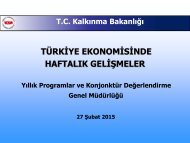You also want an ePaper? Increase the reach of your titles
YUMPU automatically turns print PDFs into web optimized ePapers that Google loves.
In 2013, S&P failed to reach a rating agreement<br />
with the Turkish Treasury. Since then, it<br />
has only issued an unpaid, unsolicited assessment.<br />
The Treasury has deals with other international<br />
rating agencies, including Fitch and Moody’s,<br />
both of which maintained the country’s investment-grade<br />
rating following the failed coup<br />
attempt.<br />
The president said Turkey was still committed<br />
to moving ahead with infrastructure projects<br />
and would continue its program of economic<br />
reform.<br />
Erdogan said that S&P’s assessment did not<br />
reflect the realities of the Turkish economy,<br />
which grew by 4.8 percent in the first quarter<br />
of 2016 compared to the same period last<br />
year.<br />
The president went on to vow that Turkey<br />
would maintain fiscal discipline.<br />
“Turkey will continue its economic reforms<br />
without any interruption....There is no liquidity<br />
problem,” he said.<br />
After declaring the state of emergency, Erdogan<br />
later addressed the crowds assembled in<br />
public squares across the country via video<br />
conferencing.<br />
Erdogan first addressed the public in the central<br />
Anatolian city of Konya before connecting<br />
with the southeastern city of Sanliurfa online<br />
from Ankara.<br />
He said the state of emergency was not martial<br />
law, stressing the move was intended to<br />
“purge terror members from state institutions<br />
and better practice democracy”.<br />
Prime Minister Binali Yildirim tweeted: “This<br />
[state of emergency] decision will not effect the<br />
daily life of our people; rather, it is intended to<br />
enhance the proper and swift functioning of<br />
state mechanisms.”<br />
Yildirim also reiterated his call to citizens to not<br />
leave the streets.<br />
Deputy Prime Minister Numan Kurtulmus, for his<br />
part, told reporters in Ankara: “The conditions<br />
of the state of emergency will only be used for<br />
fighting the [FETO-led] parallel structure.”<br />
In addition, a National Security Council and<br />
Cabinet statement asserted: “Our body has<br />
once again confirmed its commitment to democracy,<br />
fundamental rights and freedoms, and<br />
the rule of law. The steps to be taken later were<br />
also discussed.”<br />
The statement added that the state of emergency<br />
had been declared in order to protect “citizens’<br />
rights and freedoms, our democracy, and<br />
the rule of law”.<br />
Foreign Minister Mevlut Cavusoglu tweeted: “The<br />
state of emergency is definitely not opposed to<br />
democracy, the law, or freedoms; it is aimed at<br />
protecting and reinforcing these values.”<br />
Speaking to Anadolu Agency, Interior Minister<br />
Efkan Ala said the decision would not have<br />
any negative effects on the everyday lives of<br />
Turkey’s citizens.<br />
“No one need worry about it,” he said. “The<br />
state of emergency will accelerate Turkey’s<br />
fight against terrorism.”<br />
“The state of emergency is a process of empowering<br />
governors. The Turkish Armed Forces<br />
will serve the governors in the provinces<br />
and work with them. There is no limitation<br />
on fundamental rights and freedoms during<br />
a state of emergency. We guarantee this,” he<br />
added.<br />
73



